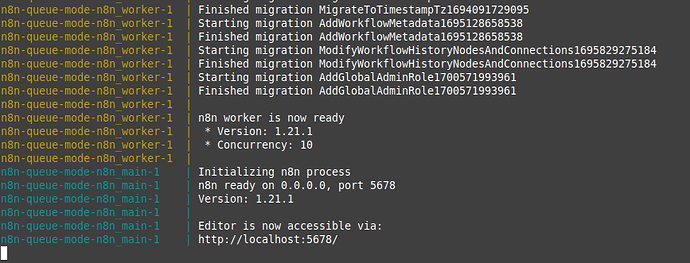I’m having difficulties setting up N8N to run in queue mode.
Following the docs, first it says to “Set encryption key” like:
export N8N_ENCRYPTION_KEY=<main_instance_encryption_key>
So in docker-compose.yml, I did:
- N8N_ENCRYPTION_KEY=<main_instance_encryption_key>
Then I tried entering in my own encryption key, like:
- N8N_ENCRYPTION_KEY=fioengo8585h
and it didn’t work, I couldn’t access N8N from the web, it said bad gateway.
That didn’t work, so I did this, which I found here in the forum:
- N8N_ENCRYPTION_KEY=${N8N_ENCRYPTION_KEY}
When I start it with docker compose up -d, it said "
WARN[0000] The “N8N_ENCRYPTION_KEY” variable is not set. Defaulting to a blank string."
I could access N8N though, so I moved forward.
Then I added EXECUTIONS_MODE=queue
Then I started Redis per the docs with:
docker run --name some-redis -p 6379:6379 -d redis
Then I went back in to docker-compose.yml and added:
QUEUE_BULL_REDIS_HOST=localhost
QUEUE_BULL_REDIS_PORT=6379
localhost didn’t work, so I tried:
QUEUE_BULL_REDIS_HOST=some-redis and
QUEUE_BULL_REDIS_HOST=redis
Then I start the worker with:
docker run --name n8n-queue -p 5679:5678 docker.n8n.io/n8nio/n8n worker
And it said it’s unable to connect to Redis.
I’m not sure what to do now? I followed the directions to the best of my ability.
Here is my docker-compose.yml:
version: "3"
services:
traefik:
image: "traefik"
restart: always
command:
- "--api=true"
- "--api.insecure=true"
- "--providers.docker=true"
- "--providers.docker.exposedbydefault=false"
- "--entrypoints.web.address=:80"
- "--entrypoints.web.http.redirections.entryPoint.to=websecure"
- "--entrypoints.web.http.redirections.entrypoint.scheme=https"
- "--entrypoints.websecure.address=:443"
- "--certificatesresolvers.mytlschallenge.acme.tlschallenge=true"
- "--certificatesresolvers.mytlschallenge.acme.email=${SSL_EMAIL}"
- "--certificatesresolvers.mytlschallenge.acme.storage=/letsencrypt/acme.json"
ports:
- "80:80"
- "443:443"
volumes:
- ${DATA_FOLDER}/letsencrypt:/letsencrypt
- /var/run/docker.sock:/var/run/docker.sock:ro
- /local-files:/files
- /root:/files
n8n:
image: n8nio/n8n:1.21.1
restart: always
ports:
- "127.0.0.1:5678:5678"
labels:
- traefik.enable=true
- traefik.http.routers.n8n.rule=Host(`${SUBDOMAIN}.${DOMAIN_NAME}`)
- traefik.http.routers.n8n.tls=true
- traefik.http.routers.n8n.entrypoints=web,websecure
- traefik.http.routers.n8n.tls.certresolver=mytlschallenge
- traefik.http.middlewares.n8n.headers.SSLRedirect=true
- traefik.http.middlewares.n8n.headers.STSSeconds=315360000
- traefik.http.middlewares.n8n.headers.browserXSSFilter=true
- traefik.http.middlewares.n8n.headers.contentTypeNosniff=true
- traefik.http.middlewares.n8n.headers.forceSTSHeader=true
- traefik.http.middlewares.n8n.headers.SSLHost=${DOMAIN_NAME}
- traefik.http.middlewares.n8n.headers.STSIncludeSubdomains=true
- traefik.http.middlewares.n8n.headers.STSPreload=true
- traefik.http.routers.n8n.middlewares=n8n@docker
environment:
- N8N_BASIC_AUTH_ACTIVE=true
- N8N_BASIC_AUTH_USER
- N8N_BASIC_AUTH_PASSWORD
- N8N_HOST=${SUBDOMAIN}.${DOMAIN_NAME}
- N8N_PORT=5678
- N8N_PROTOCOL=https
- NODE_ENV=production
- DB_TYPE=postgresdb
- DB_POSTGRESDB_DATABASE=postgres
- DB_POSTGRESDB_HOST=postgres_n8n
- DB_POSTGRESDB_PORT=5432
- DB_POSTGRESDB_USER=postgres
- DB_POSTGRESDB_PASSWORD=XXXXXX
- WEBHOOK_URL=https://${SUBDOMAIN}.${DOMAIN_NAME}/
- GENERIC_TIMEZONE=${GENERIC_TIMEZONE}
- EXECUTIONS_DATA_PRUNE=true
- EXECUTIONS_DATA_MAX_AGE=72
- EXECUTIONS_DATA_SAVE_ON_ERROR=all
- EXECUTIONS_DATA_SAVE_ON_SUCCESS=none
- EXECUTIONS_DATA_SAVE_ON_PROGRESS=false
- EXECUTIONS_DATA_SAVE_MANUAL_EXECUTIONS=true
- N8N_ENCRYPTION_KEY=${N8N_ENCRYPTION_KEY}
- EXECUTIONS_MODE=queue
- QUEUE_BULL_REDIS_HOST=some-redis
- QUEUE_BULL_REDIS_PORT=6379
volumes:
- ${DATA_FOLDER}/.n8n:/home/node/.n8n
- /local-files:/files
- /home:/files
- /root/n8n:/files
- /root:/files
- /root:/Dropbox
- ./n8n_exports:/n8n_exports
postgres_n8n:
image: postgres
restart: unless-stopped
environment:
- POSTGRES_PASSWORD=XXXXX
volumes:
- postgresN8N-volume:/var/lib/postgresql/data
volumes:
n8n_data:
postgresN8N-volume:
external: true
